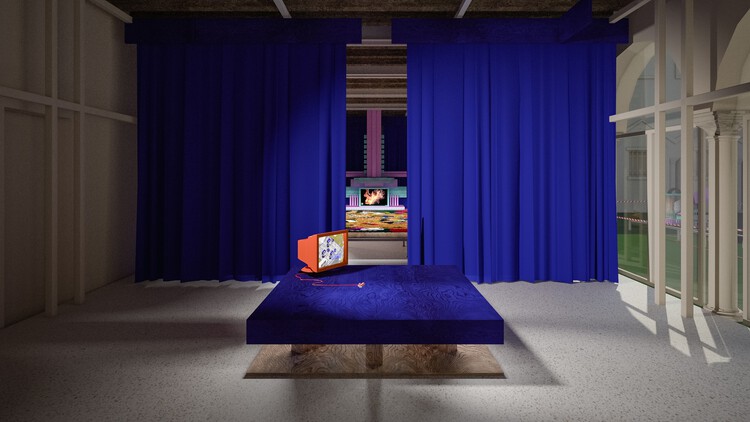
The Bulgarian contribution to the 2025 Venice Architecture Biennale is an experimental installation titled Pseudonature, situated at the intersection of nature and technology, reality and simulation. Curated by architect and designer Iassen Markov, the project explores the future of sustainability in a world where natural processes are increasingly mediated by artificial intelligence and human intervention. The exhibition features an outdoor installation that exposes technological and climate paradoxes and an interior space designed as a reimagined traditional Bulgarian room. Outside, physical interventions disrupt natural balances, highlighting the fragile interplay between technology and the environment. Inside, the space shifts to a setting for contemplation, where restoring equilibrium becomes a collective and introspective challenge.

Contradiction is at the core of the Bulgarian installation: a snow-covered courtyard at the height of summer in Venice, a solar-powered snow-making machine produces artificial snowfall, burying the panels that sustain it. The sun becomes both creator and destroyer, driving the system while simultaneously erasing it. This self-regulating cycle reveals the fragile equilibrium of so-called "sustainable technology": the stronger the sun, the more efficiently the system operates, yet as snow accumulates, energy production slows, requiring constant adaptation. The project ultimately raises the question: Do we control nature, or are we merely balancing on the edge of its ever-changing forces?

The pavilion interior features an abstract interpretation of the traditional Bulgarian 'odaya' or living room, conceived as a space for collective thought. This symbol of the Bulgarian home is reimagined as a place for interaction, where natural, artificial, and collective intelligences shape future scenarios in response to the Biennale's curatorial theme. At the center of the room, a virtual fireplace generated by AI lacks warmth, exposing the artificiality of a reconstructed environment. A handcrafted carpet by artist Rosie Eisor weaves together tradition and digital aesthetics, introducing the dialogue between the organic and the synthetic. While the 'odaya' reflects the struggle to find harmony between different forms of intelligence, the exterior installation exposes the changing balance between sun, snow, and energy.
The exhibition catalog, titled Radical Recipes for a Better Climate, transforms Pseudonature into a collection of "recipes" contributed by architects, designers, and scientists. These speculative instructions on sustainable adaptation are synthesized into a collective recipe generated by artificial intelligence. The catalog blends speculative visuals and documentary fragments, evoking the potential of humanity's evolving relationship with nature and technology. Pseudonature, as conceived by Iassen Markov, serves as a call to rethink human agency in the face of paradox and contradiction, affirming that sustainability is no longer just about preservation but about adaptation, reinvention, and the dynamic interplay between human ingenuity, artificial intelligence, and the natural world.

The Pavilion of the Republic of Bulgaria at the 19th International Architecture Exhibition – La Biennale di Venezia is organized by the Ministry of Culture of Bulgaria and commissioned by Alexander Staynov. It will be located in the Sala Tiziano, Centro Culturale Don Orione Artigianelli. Other national exhibitions at this edition of the Biennale address similar themes: the Pakistani Pavilion examines the dual nature of resilience and vulnerability in the face of climate change, using Pakistan's rich geological and cultural heritage to address global environmental inequities. The Japanese Pavilion investigates the evolving role of artificial intelligence (AI) in architecture, focusing on the concept of the "in-between." Meanwhile, the Chilean Pavilion questions the impact of data centers on urban, territorial, material, and political landscapes through a multimedia exhibition.







